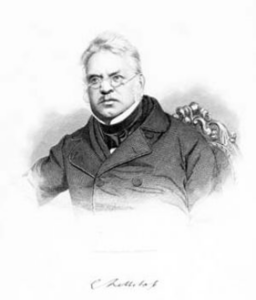Serenade
(Poet's title: Ständchen)
Set by Schubert:
D 957/4
[August 1828]
Part of 13 Lieder nach Gedichten von Rellstab und Heine (“Schwanengesang”), D 957
Leise flehen meine Lieder
Durch die Nacht zu dir,
In den stillen Hain hernieder,
Liebchen, komm zu mir.
Flüsternd schlanke Wipfel rauschen
In des Mondes Licht,
Des Verräters feindlich Lauschen
Fürchte, Holde, nicht.
Hörst die Nachtigallen schlagen?
Ach, sie flehen dich,
Mit der Töne süßen Klagen
Flehen sie für mich.
Sie verstehn des Busens Sehnen,
Kennen Liebesschmerz,
Rühren mit den Silbertönen
Jedes weiche Herz.
Lass auch dir die Brust bewegen,
Liebchen, höre mich!
Bebend harr ich dir entgegen,
Komm, beglücke mich.
My songs call out gently
Through the night as they beseech you;
Come down here into the quiet grove of trees,
Beloved, come to me!
Slender tree tops whisper as they rustle
In the moonlight;
No hostile traitor is going to overhear,
So do not be afraid, my love.
Can you hear the nightingales singing?
Oh, they are beseeching you
With the sweet notes of their laments,
They are interceding with you on my behalf.
They can understand the longing of the breast,
They are familiar with the pain of love,
With their silver notes they stir
Every sensitive heart.
Let your own breast be moved too,
Beloved, listen to me!
I am trembling as I await your response;
Come, make me happy!
All translations into English that appear on this website, unless otherwise stated, are by Malcolm Wren. You are free to use them on condition that you acknowledge Malcolm Wren as the translator and schubertsong.uk as the source. Unless otherwise stated, the comments and essays that appear after the texts and translations are by Malcolm Wren and are © Copyright.
☙
Themes and images in this text:
Chest / breast Hearts Laments, elegies and mourning Longing and yearning Night and the moon Nightingales, Philomel Trees (general) Serenades and songs at evening Silver Whispering Woods – groves and clumps of trees (Hain)
This is a ‘Ständchen‘, which can only be translated into English as ‘serenade’. There is therefore a danger that we might misinterpret what is going on slightly. Many of us will associate serenades with warm Mediterranean evenings, girls on balconies happily listening to young men singing and playing a guitar or lute. However, there are not many balconies in northern Europe and the underlying social structures (of kinship, courtship rituals etc.) are (and were) different to those south of the Alps and the Pyrenees. The word ‘Ständchen’ originally signified that the song was to be sung standing up (no lounging around or lying on the grass). Unlike the Italian ‘serenata’ or the French ‘sérénade’ there is no underlying idea that the tone is ‘serene’ or the time is ‘evening’ (‘sera’).
Rellstab’s text is full of anxiety and longing rather than the calm, serene enjoyment of requited love. The listener is not confined to the house, but is invited to come and join the singer in the silence and the cover of the trees. One or both of these lovers (if that is what they are) has expressed worries about being observed by a hostile traitor. Yes, this might be a disapproving father but it could be any number of interfering busybodies who do not like the idea of this particular couple getting together. We are free to imagine a number of scenarios, from a same-sex assignation to adultery (or both at the same time, of course).
Different poets hear different things in the song of the nightingale, but in this case there is no ambiguity. The nightingales are singing a lament, they are expressing pain and longing rather than fulfilment. They are presented as speaking on behalf of the singer. Their eloquence and fluency make up for what is lacking in the human voice yet there is no artifice in their song, which flows directly from their distress.
The nightingales are singing. There is moonlight. It is night-time rather than evening. Any meeting that takes place is going to be hidden (unlike those southern European serenades in which the purpose is to declare one’s passion openly by the light of the setting sun). The speaker has no confidence that the beloved is going to respond in the way desired, nor do we ever learn the outcome. That remains secret.
☙
Original Spelling Ständchen Leise flehen meine Lieder Durch die Nacht zu Dir; In den stillen Hain hernieder, Liebchen, komm' zu mir! Flüsternd schlanke Wipfel rauschen In des Mondes Licht; Des Verräthers feindlich Lauschen Fürchte, Holde, nicht. Hörst die Nachtigallen schlagen? Ach! sie flehen Dich, Mit der Töne süßen Klagen Flehen sie für mich. Sie verstehn des Busens Sehnen, Kennen Liebesschmerz, Rühren mit den Silbertönen Jedes weiche Herz. Laß auch D i r die Brust bewegen, Liebchen, höre mich! Bebend harr' ich Dir entgegen; Komm', beglücke mich!
Confirmed by Peter Rastl with Gedichte von Ludwig Rellstab. Erstes Bändchen. Berlin, bei Friedrich Laue. 1827, pages 101-102.
To see an early edition of the text, go to page 101 [117/265] here: http://digital.ub.uni-duesseldorf.de/download/pdf/3376501


